Employability Skills Unit 47: Analysis of Carer Role Performance
VerifiedAdded on 2021/08/10
|8
|3420
|245
Report
AI Summary
This report examines the employability skills of a Carer within a care home setting. It explores the importance of understanding workplace rules and regulations, including health and safety, and how these affect rights and responsibilities. The report details the process of setting performance objectives, emphasizing the need for measurable steps, clear goals, and effective communication. It also addresses the significance of teamwork, time management, and the impact of communication on workplace problems. Furthermore, the report analyzes different team roles, potential issues in team dynamics, and strategies for improving team performance. The analysis covers various aspects of the Carer's role, including how to improve communication, manage time effectively, and contribute to a productive team environment. The report also highlights the importance of recognizing individual contributions and providing feedback to boost morale and motivation within the workplace.

UNIT 47 EMPLOYABILITY SKILLS
Paraphrase This Document
Need a fresh take? Get an instant paraphrase of this document with our AI Paraphraser
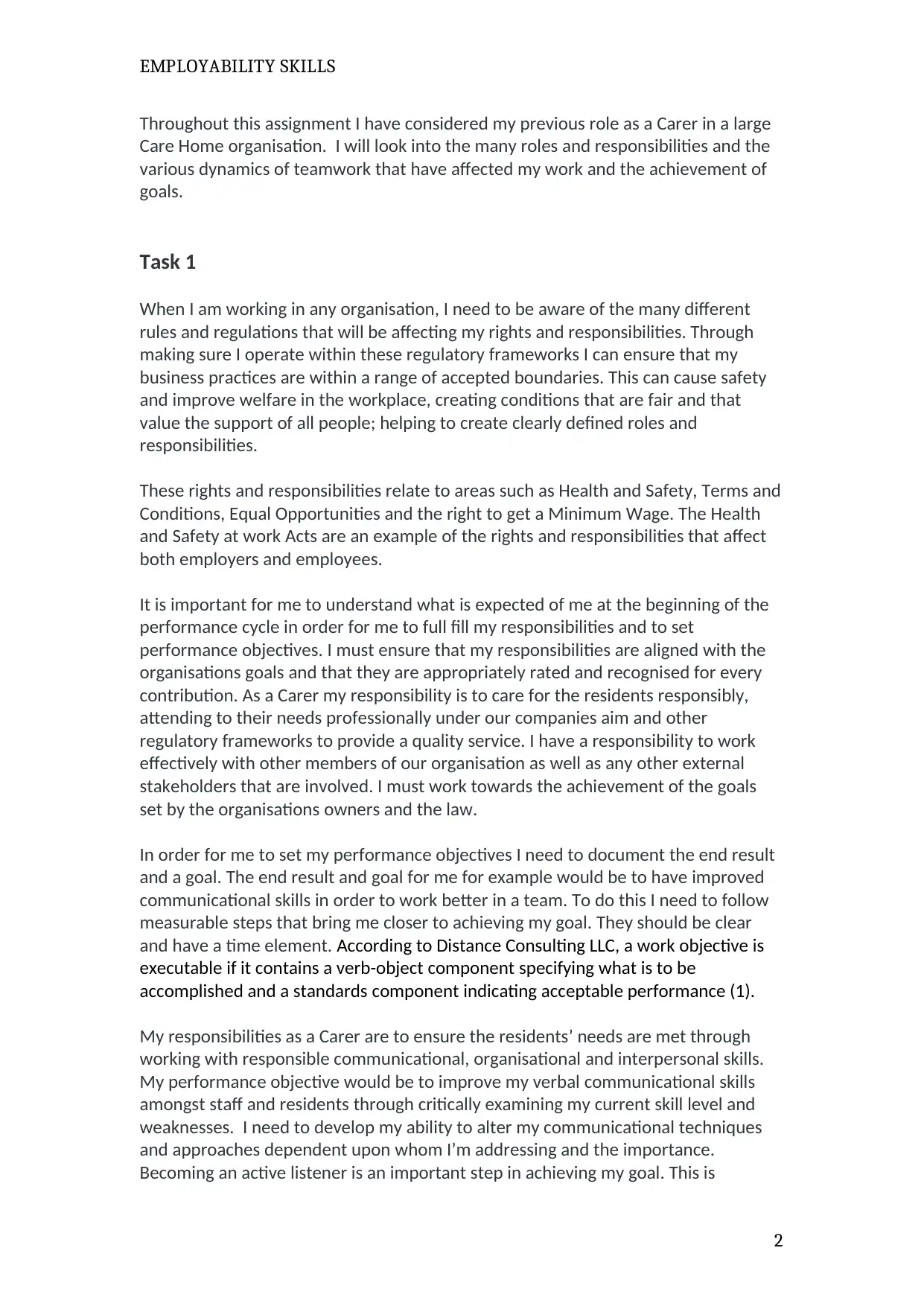
EMPLOYABILITY SKILLS
Throughout this assignment I have considered my previous role as a Carer in a large
Care Home organisation. I will look into the many roles and responsibilities and the
various dynamics of teamwork that have affected my work and the achievement of
goals.
Task 1
When I am working in any organisation, I need to be aware of the many different
rules and regulations that will be affecting my rights and responsibilities. Through
making sure I operate within these regulatory frameworks I can ensure that my
business practices are within a range of accepted boundaries. This can cause safety
and improve welfare in the workplace, creating conditions that are fair and that
value the support of all people; helping to create clearly defined roles and
responsibilities.
These rights and responsibilities relate to areas such as Health and Safety, Terms and
Conditions, Equal Opportunities and the right to get a Minimum Wage. The Health
and Safety at work Acts are an example of the rights and responsibilities that affect
both employers and employees.
It is important for me to understand what is expected of me at the beginning of the
performance cycle in order for me to full fill my responsibilities and to set
performance objectives. I must ensure that my responsibilities are aligned with the
organisations goals and that they are appropriately rated and recognised for every
contribution. As a Carer my responsibility is to care for the residents responsibly,
attending to their needs professionally under our companies aim and other
regulatory frameworks to provide a quality service. I have a responsibility to work
effectively with other members of our organisation as well as any other external
stakeholders that are involved. I must work towards the achievement of the goals
set by the organisations owners and the law.
In order for me to set my performance objectives I need to document the end result
and a goal. The end result and goal for me for example would be to have improved
communicational skills in order to work better in a team. To do this I need to follow
measurable steps that bring me closer to achieving my goal. They should be clear
and have a time element. According to Distance Consulting LLC, a work objective is
executable if it contains a verb-object component specifying what is to be
accomplished and a standards component indicating acceptable performance (1).
My responsibilities as a Carer are to ensure the residents’ needs are met through
working with responsible communicational, organisational and interpersonal skills.
My performance objective would be to improve my verbal communicational skills
amongst staff and residents through critically examining my current skill level and
weaknesses. I need to develop my ability to alter my communicational techniques
and approaches dependent upon whom I’m addressing and the importance.
Becoming an active listener is an important step in achieving my goal. This is
2
Throughout this assignment I have considered my previous role as a Carer in a large
Care Home organisation. I will look into the many roles and responsibilities and the
various dynamics of teamwork that have affected my work and the achievement of
goals.
Task 1
When I am working in any organisation, I need to be aware of the many different
rules and regulations that will be affecting my rights and responsibilities. Through
making sure I operate within these regulatory frameworks I can ensure that my
business practices are within a range of accepted boundaries. This can cause safety
and improve welfare in the workplace, creating conditions that are fair and that
value the support of all people; helping to create clearly defined roles and
responsibilities.
These rights and responsibilities relate to areas such as Health and Safety, Terms and
Conditions, Equal Opportunities and the right to get a Minimum Wage. The Health
and Safety at work Acts are an example of the rights and responsibilities that affect
both employers and employees.
It is important for me to understand what is expected of me at the beginning of the
performance cycle in order for me to full fill my responsibilities and to set
performance objectives. I must ensure that my responsibilities are aligned with the
organisations goals and that they are appropriately rated and recognised for every
contribution. As a Carer my responsibility is to care for the residents responsibly,
attending to their needs professionally under our companies aim and other
regulatory frameworks to provide a quality service. I have a responsibility to work
effectively with other members of our organisation as well as any other external
stakeholders that are involved. I must work towards the achievement of the goals
set by the organisations owners and the law.
In order for me to set my performance objectives I need to document the end result
and a goal. The end result and goal for me for example would be to have improved
communicational skills in order to work better in a team. To do this I need to follow
measurable steps that bring me closer to achieving my goal. They should be clear
and have a time element. According to Distance Consulting LLC, a work objective is
executable if it contains a verb-object component specifying what is to be
accomplished and a standards component indicating acceptable performance (1).
My responsibilities as a Carer are to ensure the residents’ needs are met through
working with responsible communicational, organisational and interpersonal skills.
My performance objective would be to improve my verbal communicational skills
amongst staff and residents through critically examining my current skill level and
weaknesses. I need to develop my ability to alter my communicational techniques
and approaches dependent upon whom I’m addressing and the importance.
Becoming an active listener is an important step in achieving my goal. This is
2
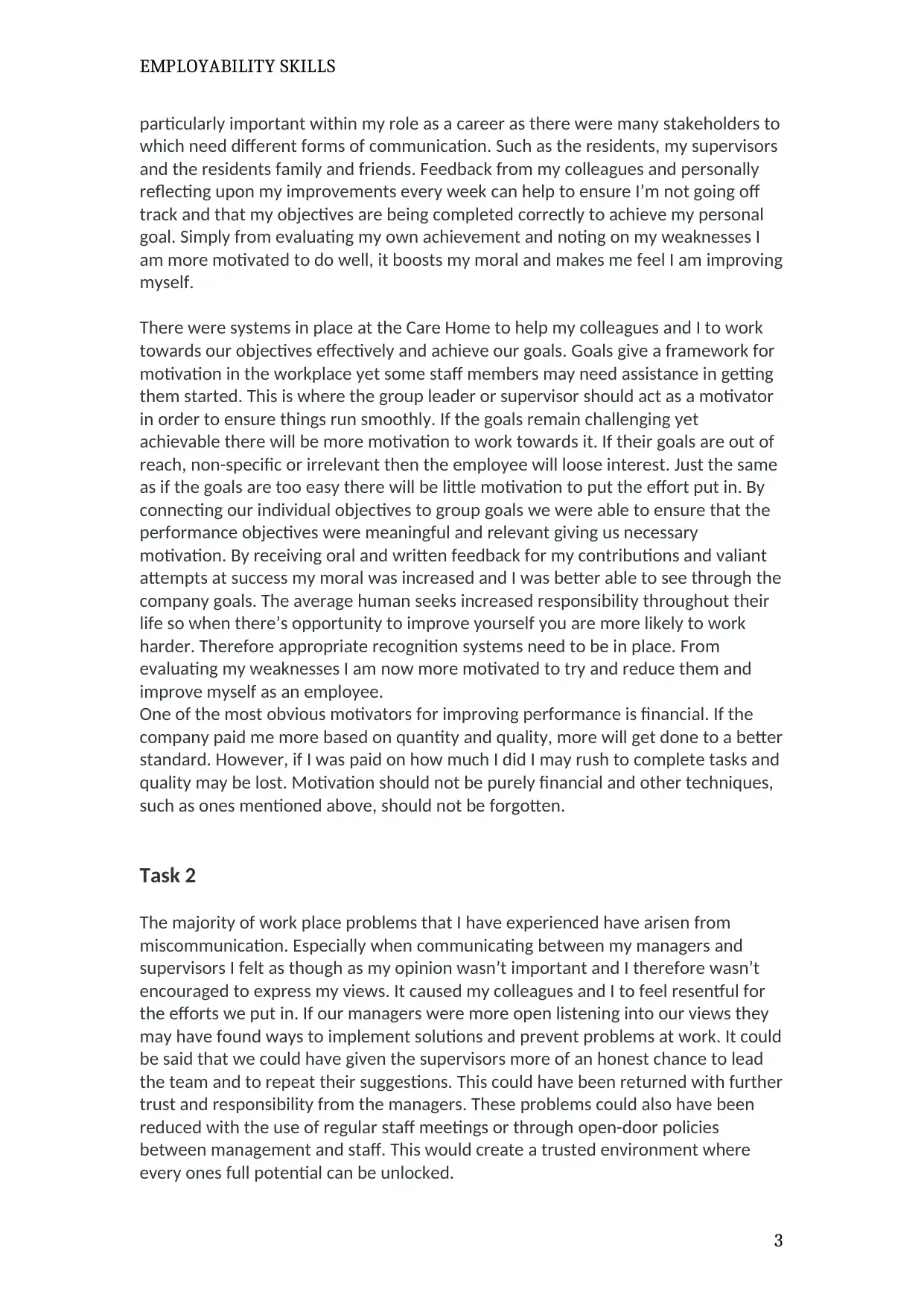
EMPLOYABILITY SKILLS
particularly important within my role as a career as there were many stakeholders to
which need different forms of communication. Such as the residents, my supervisors
and the residents family and friends. Feedback from my colleagues and personally
reflecting upon my improvements every week can help to ensure I’m not going off
track and that my objectives are being completed correctly to achieve my personal
goal. Simply from evaluating my own achievement and noting on my weaknesses I
am more motivated to do well, it boosts my moral and makes me feel I am improving
myself.
There were systems in place at the Care Home to help my colleagues and I to work
towards our objectives effectively and achieve our goals. Goals give a framework for
motivation in the workplace yet some staff members may need assistance in getting
them started. This is where the group leader or supervisor should act as a motivator
in order to ensure things run smoothly. If the goals remain challenging yet
achievable there will be more motivation to work towards it. If their goals are out of
reach, non-specific or irrelevant then the employee will loose interest. Just the same
as if the goals are too easy there will be little motivation to put the effort put in. By
connecting our individual objectives to group goals we were able to ensure that the
performance objectives were meaningful and relevant giving us necessary
motivation. By receiving oral and written feedback for my contributions and valiant
attempts at success my moral was increased and I was better able to see through the
company goals. The average human seeks increased responsibility throughout their
life so when there’s opportunity to improve yourself you are more likely to work
harder. Therefore appropriate recognition systems need to be in place. From
evaluating my weaknesses I am now more motivated to try and reduce them and
improve myself as an employee.
One of the most obvious motivators for improving performance is financial. If the
company paid me more based on quantity and quality, more will get done to a better
standard. However, if I was paid on how much I did I may rush to complete tasks and
quality may be lost. Motivation should not be purely financial and other techniques,
such as ones mentioned above, should not be forgotten.
Task 2
The majority of work place problems that I have experienced have arisen from
miscommunication. Especially when communicating between my managers and
supervisors I felt as though as my opinion wasn’t important and I therefore wasn’t
encouraged to express my views. It caused my colleagues and I to feel resentful for
the efforts we put in. If our managers were more open listening into our views they
may have found ways to implement solutions and prevent problems at work. It could
be said that we could have given the supervisors more of an honest chance to lead
the team and to repeat their suggestions. This could have been returned with further
trust and responsibility from the managers. These problems could also have been
reduced with the use of regular staff meetings or through open-door policies
between management and staff. This would create a trusted environment where
every ones full potential can be unlocked.
3
particularly important within my role as a career as there were many stakeholders to
which need different forms of communication. Such as the residents, my supervisors
and the residents family and friends. Feedback from my colleagues and personally
reflecting upon my improvements every week can help to ensure I’m not going off
track and that my objectives are being completed correctly to achieve my personal
goal. Simply from evaluating my own achievement and noting on my weaknesses I
am more motivated to do well, it boosts my moral and makes me feel I am improving
myself.
There were systems in place at the Care Home to help my colleagues and I to work
towards our objectives effectively and achieve our goals. Goals give a framework for
motivation in the workplace yet some staff members may need assistance in getting
them started. This is where the group leader or supervisor should act as a motivator
in order to ensure things run smoothly. If the goals remain challenging yet
achievable there will be more motivation to work towards it. If their goals are out of
reach, non-specific or irrelevant then the employee will loose interest. Just the same
as if the goals are too easy there will be little motivation to put the effort put in. By
connecting our individual objectives to group goals we were able to ensure that the
performance objectives were meaningful and relevant giving us necessary
motivation. By receiving oral and written feedback for my contributions and valiant
attempts at success my moral was increased and I was better able to see through the
company goals. The average human seeks increased responsibility throughout their
life so when there’s opportunity to improve yourself you are more likely to work
harder. Therefore appropriate recognition systems need to be in place. From
evaluating my weaknesses I am now more motivated to try and reduce them and
improve myself as an employee.
One of the most obvious motivators for improving performance is financial. If the
company paid me more based on quantity and quality, more will get done to a better
standard. However, if I was paid on how much I did I may rush to complete tasks and
quality may be lost. Motivation should not be purely financial and other techniques,
such as ones mentioned above, should not be forgotten.
Task 2
The majority of work place problems that I have experienced have arisen from
miscommunication. Especially when communicating between my managers and
supervisors I felt as though as my opinion wasn’t important and I therefore wasn’t
encouraged to express my views. It caused my colleagues and I to feel resentful for
the efforts we put in. If our managers were more open listening into our views they
may have found ways to implement solutions and prevent problems at work. It could
be said that we could have given the supervisors more of an honest chance to lead
the team and to repeat their suggestions. This could have been returned with further
trust and responsibility from the managers. These problems could also have been
reduced with the use of regular staff meetings or through open-door policies
between management and staff. This would create a trusted environment where
every ones full potential can be unlocked.
3
⊘ This is a preview!⊘
Do you want full access?
Subscribe today to unlock all pages.

Trusted by 1+ million students worldwide
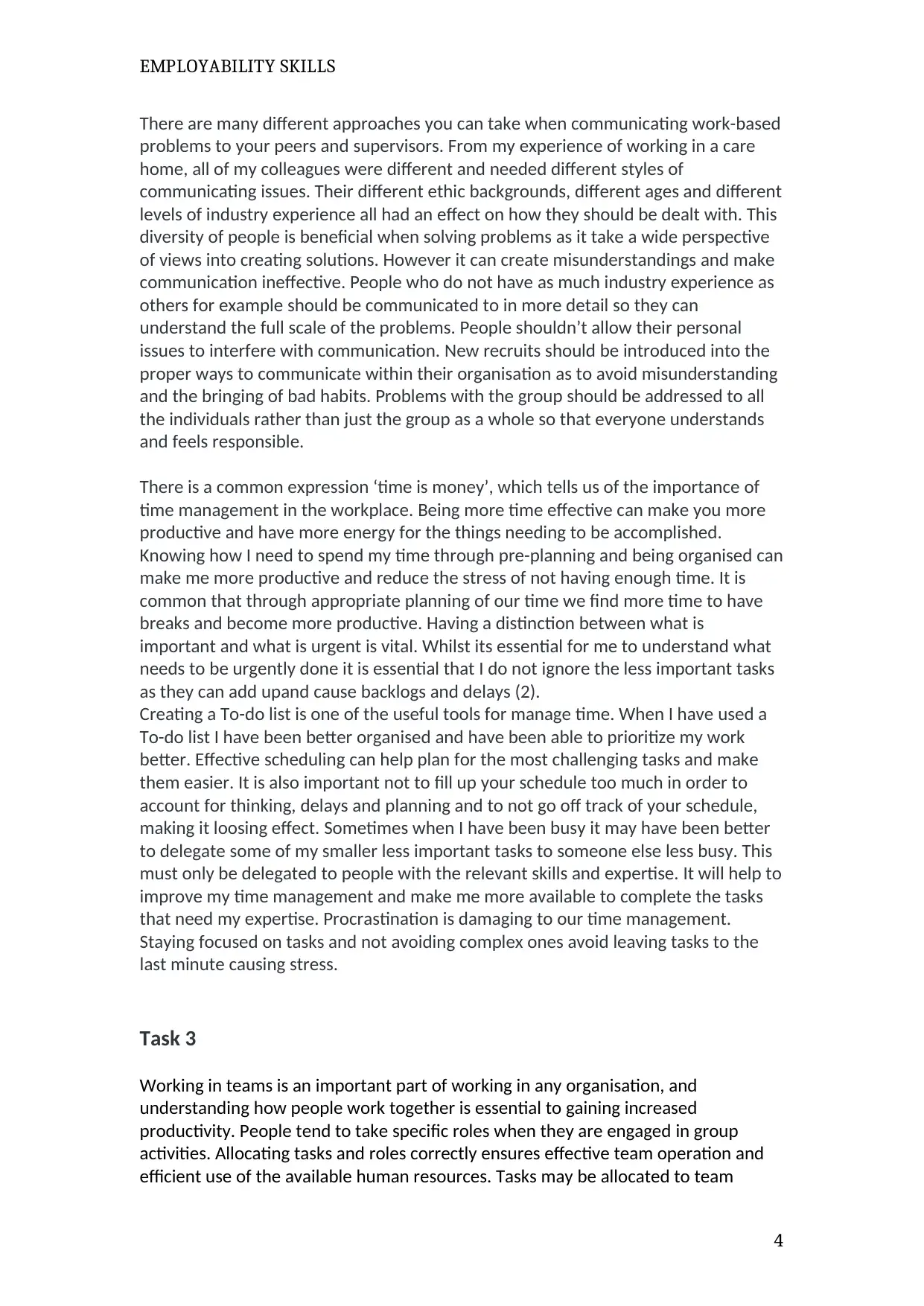
EMPLOYABILITY SKILLS
There are many different approaches you can take when communicating work-based
problems to your peers and supervisors. From my experience of working in a care
home, all of my colleagues were different and needed different styles of
communicating issues. Their different ethic backgrounds, different ages and different
levels of industry experience all had an effect on how they should be dealt with. This
diversity of people is beneficial when solving problems as it take a wide perspective
of views into creating solutions. However it can create misunderstandings and make
communication ineffective. People who do not have as much industry experience as
others for example should be communicated to in more detail so they can
understand the full scale of the problems. People shouldn’t allow their personal
issues to interfere with communication. New recruits should be introduced into the
proper ways to communicate within their organisation as to avoid misunderstanding
and the bringing of bad habits. Problems with the group should be addressed to all
the individuals rather than just the group as a whole so that everyone understands
and feels responsible.
There is a common expression ‘time is money’, which tells us of the importance of
time management in the workplace. Being more time effective can make you more
productive and have more energy for the things needing to be accomplished.
Knowing how I need to spend my time through pre-planning and being organised can
make me more productive and reduce the stress of not having enough time. It is
common that through appropriate planning of our time we find more time to have
breaks and become more productive. Having a distinction between what is
important and what is urgent is vital. Whilst its essential for me to understand what
needs to be urgently done it is essential that I do not ignore the less important tasks
as they can add upand cause backlogs and delays (2).
Creating a To-do list is one of the useful tools for manage time. When I have used a
To-do list I have been better organised and have been able to prioritize my work
better. Effective scheduling can help plan for the most challenging tasks and make
them easier. It is also important not to fill up your schedule too much in order to
account for thinking, delays and planning and to not go off track of your schedule,
making it loosing effect. Sometimes when I have been busy it may have been better
to delegate some of my smaller less important tasks to someone else less busy. This
must only be delegated to people with the relevant skills and expertise. It will help to
improve my time management and make me more available to complete the tasks
that need my expertise. Procrastination is damaging to our time management.
Staying focused on tasks and not avoiding complex ones avoid leaving tasks to the
last minute causing stress.
Task 3
Working in teams is an important part of working in any organisation, and
understanding how people work together is essential to gaining increased
productivity. People tend to take specific roles when they are engaged in group
activities. Allocating tasks and roles correctly ensures effective team operation and
efficient use of the available human resources. Tasks may be allocated to team
4
There are many different approaches you can take when communicating work-based
problems to your peers and supervisors. From my experience of working in a care
home, all of my colleagues were different and needed different styles of
communicating issues. Their different ethic backgrounds, different ages and different
levels of industry experience all had an effect on how they should be dealt with. This
diversity of people is beneficial when solving problems as it take a wide perspective
of views into creating solutions. However it can create misunderstandings and make
communication ineffective. People who do not have as much industry experience as
others for example should be communicated to in more detail so they can
understand the full scale of the problems. People shouldn’t allow their personal
issues to interfere with communication. New recruits should be introduced into the
proper ways to communicate within their organisation as to avoid misunderstanding
and the bringing of bad habits. Problems with the group should be addressed to all
the individuals rather than just the group as a whole so that everyone understands
and feels responsible.
There is a common expression ‘time is money’, which tells us of the importance of
time management in the workplace. Being more time effective can make you more
productive and have more energy for the things needing to be accomplished.
Knowing how I need to spend my time through pre-planning and being organised can
make me more productive and reduce the stress of not having enough time. It is
common that through appropriate planning of our time we find more time to have
breaks and become more productive. Having a distinction between what is
important and what is urgent is vital. Whilst its essential for me to understand what
needs to be urgently done it is essential that I do not ignore the less important tasks
as they can add upand cause backlogs and delays (2).
Creating a To-do list is one of the useful tools for manage time. When I have used a
To-do list I have been better organised and have been able to prioritize my work
better. Effective scheduling can help plan for the most challenging tasks and make
them easier. It is also important not to fill up your schedule too much in order to
account for thinking, delays and planning and to not go off track of your schedule,
making it loosing effect. Sometimes when I have been busy it may have been better
to delegate some of my smaller less important tasks to someone else less busy. This
must only be delegated to people with the relevant skills and expertise. It will help to
improve my time management and make me more available to complete the tasks
that need my expertise. Procrastination is damaging to our time management.
Staying focused on tasks and not avoiding complex ones avoid leaving tasks to the
last minute causing stress.
Task 3
Working in teams is an important part of working in any organisation, and
understanding how people work together is essential to gaining increased
productivity. People tend to take specific roles when they are engaged in group
activities. Allocating tasks and roles correctly ensures effective team operation and
efficient use of the available human resources. Tasks may be allocated to team
4
Paraphrase This Document
Need a fresh take? Get an instant paraphrase of this document with our AI Paraphraser
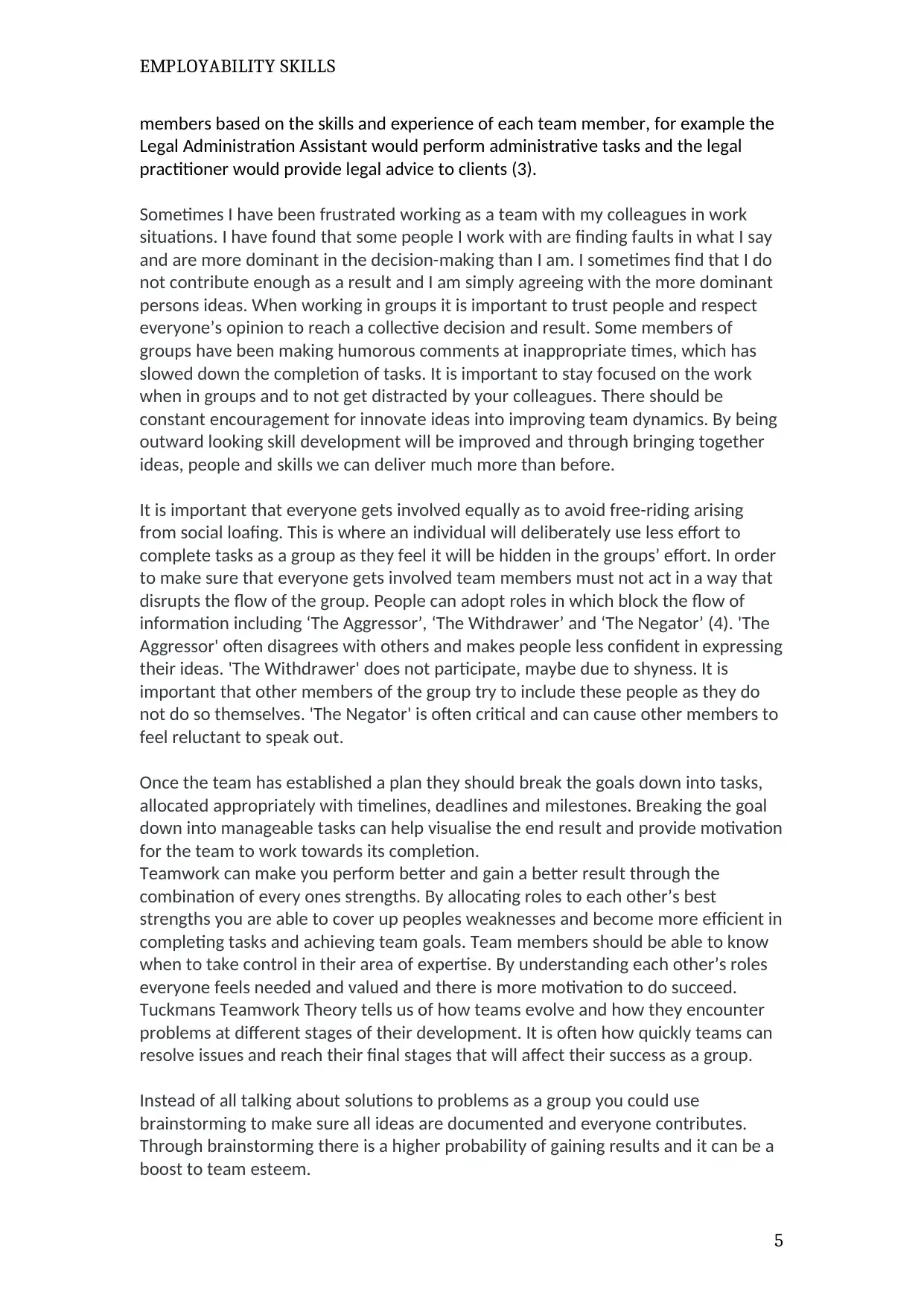
EMPLOYABILITY SKILLS
members based on the skills and experience of each team member, for example the
Legal Administration Assistant would perform administrative tasks and the legal
practitioner would provide legal advice to clients (3).
Sometimes I have been frustrated working as a team with my colleagues in work
situations. I have found that some people I work with are finding faults in what I say
and are more dominant in the decision-making than I am. I sometimes find that I do
not contribute enough as a result and I am simply agreeing with the more dominant
persons ideas. When working in groups it is important to trust people and respect
everyone’s opinion to reach a collective decision and result. Some members of
groups have been making humorous comments at inappropriate times, which has
slowed down the completion of tasks. It is important to stay focused on the work
when in groups and to not get distracted by your colleagues. There should be
constant encouragement for innovate ideas into improving team dynamics. By being
outward looking skill development will be improved and through bringing together
ideas, people and skills we can deliver much more than before.
It is important that everyone gets involved equally as to avoid free-riding arising
from social loafing. This is where an individual will deliberately use less effort to
complete tasks as a group as they feel it will be hidden in the groups’ effort. In order
to make sure that everyone gets involved team members must not act in a way that
disrupts the flow of the group. People can adopt roles in which block the flow of
information including ‘The Aggressor’, ‘The Withdrawer’ and ‘The Negator’ (4). 'The
Aggressor' often disagrees with others and makes people less confident in expressing
their ideas. 'The Withdrawer' does not participate, maybe due to shyness. It is
important that other members of the group try to include these people as they do
not do so themselves. 'The Negator' is often critical and can cause other members to
feel reluctant to speak out.
Once the team has established a plan they should break the goals down into tasks,
allocated appropriately with timelines, deadlines and milestones. Breaking the goal
down into manageable tasks can help visualise the end result and provide motivation
for the team to work towards its completion.
Teamwork can make you perform better and gain a better result through the
combination of every ones strengths. By allocating roles to each other’s best
strengths you are able to cover up peoples weaknesses and become more efficient in
completing tasks and achieving team goals. Team members should be able to know
when to take control in their area of expertise. By understanding each other’s roles
everyone feels needed and valued and there is more motivation to do succeed.
Tuckmans Teamwork Theory tells us of how teams evolve and how they encounter
problems at different stages of their development. It is often how quickly teams can
resolve issues and reach their final stages that will affect their success as a group.
Instead of all talking about solutions to problems as a group you could use
brainstorming to make sure all ideas are documented and everyone contributes.
Through brainstorming there is a higher probability of gaining results and it can be a
boost to team esteem.
5
members based on the skills and experience of each team member, for example the
Legal Administration Assistant would perform administrative tasks and the legal
practitioner would provide legal advice to clients (3).
Sometimes I have been frustrated working as a team with my colleagues in work
situations. I have found that some people I work with are finding faults in what I say
and are more dominant in the decision-making than I am. I sometimes find that I do
not contribute enough as a result and I am simply agreeing with the more dominant
persons ideas. When working in groups it is important to trust people and respect
everyone’s opinion to reach a collective decision and result. Some members of
groups have been making humorous comments at inappropriate times, which has
slowed down the completion of tasks. It is important to stay focused on the work
when in groups and to not get distracted by your colleagues. There should be
constant encouragement for innovate ideas into improving team dynamics. By being
outward looking skill development will be improved and through bringing together
ideas, people and skills we can deliver much more than before.
It is important that everyone gets involved equally as to avoid free-riding arising
from social loafing. This is where an individual will deliberately use less effort to
complete tasks as a group as they feel it will be hidden in the groups’ effort. In order
to make sure that everyone gets involved team members must not act in a way that
disrupts the flow of the group. People can adopt roles in which block the flow of
information including ‘The Aggressor’, ‘The Withdrawer’ and ‘The Negator’ (4). 'The
Aggressor' often disagrees with others and makes people less confident in expressing
their ideas. 'The Withdrawer' does not participate, maybe due to shyness. It is
important that other members of the group try to include these people as they do
not do so themselves. 'The Negator' is often critical and can cause other members to
feel reluctant to speak out.
Once the team has established a plan they should break the goals down into tasks,
allocated appropriately with timelines, deadlines and milestones. Breaking the goal
down into manageable tasks can help visualise the end result and provide motivation
for the team to work towards its completion.
Teamwork can make you perform better and gain a better result through the
combination of every ones strengths. By allocating roles to each other’s best
strengths you are able to cover up peoples weaknesses and become more efficient in
completing tasks and achieving team goals. Team members should be able to know
when to take control in their area of expertise. By understanding each other’s roles
everyone feels needed and valued and there is more motivation to do succeed.
Tuckmans Teamwork Theory tells us of how teams evolve and how they encounter
problems at different stages of their development. It is often how quickly teams can
resolve issues and reach their final stages that will affect their success as a group.
Instead of all talking about solutions to problems as a group you could use
brainstorming to make sure all ideas are documented and everyone contributes.
Through brainstorming there is a higher probability of gaining results and it can be a
boost to team esteem.
5
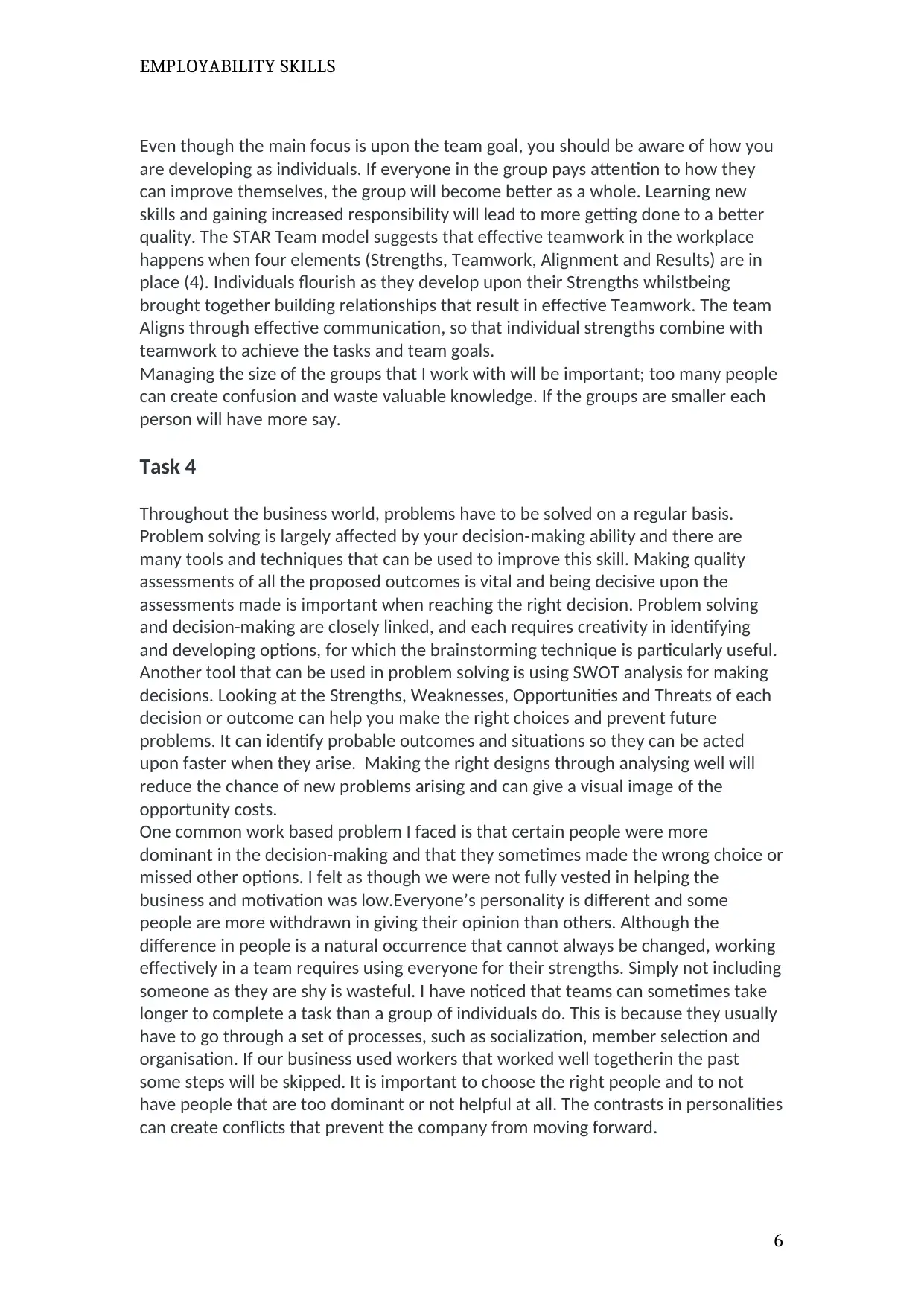
EMPLOYABILITY SKILLS
Even though the main focus is upon the team goal, you should be aware of how you
are developing as individuals. If everyone in the group pays attention to how they
can improve themselves, the group will become better as a whole. Learning new
skills and gaining increased responsibility will lead to more getting done to a better
quality. The STAR Team model suggests that effective teamwork in the workplace
happens when four elements (Strengths, Teamwork, Alignment and Results) are in
place (4). Individuals flourish as they develop upon their Strengths whilstbeing
brought together building relationships that result in effective Teamwork. The team
Aligns through effective communication, so that individual strengths combine with
teamwork to achieve the tasks and team goals.
Managing the size of the groups that I work with will be important; too many people
can create confusion and waste valuable knowledge. If the groups are smaller each
person will have more say.
Task 4
Throughout the business world, problems have to be solved on a regular basis.
Problem solving is largely affected by your decision-making ability and there are
many tools and techniques that can be used to improve this skill. Making quality
assessments of all the proposed outcomes is vital and being decisive upon the
assessments made is important when reaching the right decision. Problem solving
and decision-making are closely linked, and each requires creativity in identifying
and developing options, for which the brainstorming technique is particularly useful.
Another tool that can be used in problem solving is using SWOT analysis for making
decisions. Looking at the Strengths, Weaknesses, Opportunities and Threats of each
decision or outcome can help you make the right choices and prevent future
problems. It can identify probable outcomes and situations so they can be acted
upon faster when they arise. Making the right designs through analysing well will
reduce the chance of new problems arising and can give a visual image of the
opportunity costs.
One common work based problem I faced is that certain people were more
dominant in the decision-making and that they sometimes made the wrong choice or
missed other options. I felt as though we were not fully vested in helping the
business and motivation was low.Everyone’s personality is different and some
people are more withdrawn in giving their opinion than others. Although the
difference in people is a natural occurrence that cannot always be changed, working
effectively in a team requires using everyone for their strengths. Simply not including
someone as they are shy is wasteful. I have noticed that teams can sometimes take
longer to complete a task than a group of individuals do. This is because they usually
have to go through a set of processes, such as socialization, member selection and
organisation. If our business used workers that worked well togetherin the past
some steps will be skipped. It is important to choose the right people and to not
have people that are too dominant or not helpful at all. The contrasts in personalities
can create conflicts that prevent the company from moving forward.
6
Even though the main focus is upon the team goal, you should be aware of how you
are developing as individuals. If everyone in the group pays attention to how they
can improve themselves, the group will become better as a whole. Learning new
skills and gaining increased responsibility will lead to more getting done to a better
quality. The STAR Team model suggests that effective teamwork in the workplace
happens when four elements (Strengths, Teamwork, Alignment and Results) are in
place (4). Individuals flourish as they develop upon their Strengths whilstbeing
brought together building relationships that result in effective Teamwork. The team
Aligns through effective communication, so that individual strengths combine with
teamwork to achieve the tasks and team goals.
Managing the size of the groups that I work with will be important; too many people
can create confusion and waste valuable knowledge. If the groups are smaller each
person will have more say.
Task 4
Throughout the business world, problems have to be solved on a regular basis.
Problem solving is largely affected by your decision-making ability and there are
many tools and techniques that can be used to improve this skill. Making quality
assessments of all the proposed outcomes is vital and being decisive upon the
assessments made is important when reaching the right decision. Problem solving
and decision-making are closely linked, and each requires creativity in identifying
and developing options, for which the brainstorming technique is particularly useful.
Another tool that can be used in problem solving is using SWOT analysis for making
decisions. Looking at the Strengths, Weaknesses, Opportunities and Threats of each
decision or outcome can help you make the right choices and prevent future
problems. It can identify probable outcomes and situations so they can be acted
upon faster when they arise. Making the right designs through analysing well will
reduce the chance of new problems arising and can give a visual image of the
opportunity costs.
One common work based problem I faced is that certain people were more
dominant in the decision-making and that they sometimes made the wrong choice or
missed other options. I felt as though we were not fully vested in helping the
business and motivation was low.Everyone’s personality is different and some
people are more withdrawn in giving their opinion than others. Although the
difference in people is a natural occurrence that cannot always be changed, working
effectively in a team requires using everyone for their strengths. Simply not including
someone as they are shy is wasteful. I have noticed that teams can sometimes take
longer to complete a task than a group of individuals do. This is because they usually
have to go through a set of processes, such as socialization, member selection and
organisation. If our business used workers that worked well togetherin the past
some steps will be skipped. It is important to choose the right people and to not
have people that are too dominant or not helpful at all. The contrasts in personalities
can create conflicts that prevent the company from moving forward.
6
⊘ This is a preview!⊘
Do you want full access?
Subscribe today to unlock all pages.

Trusted by 1+ million students worldwide
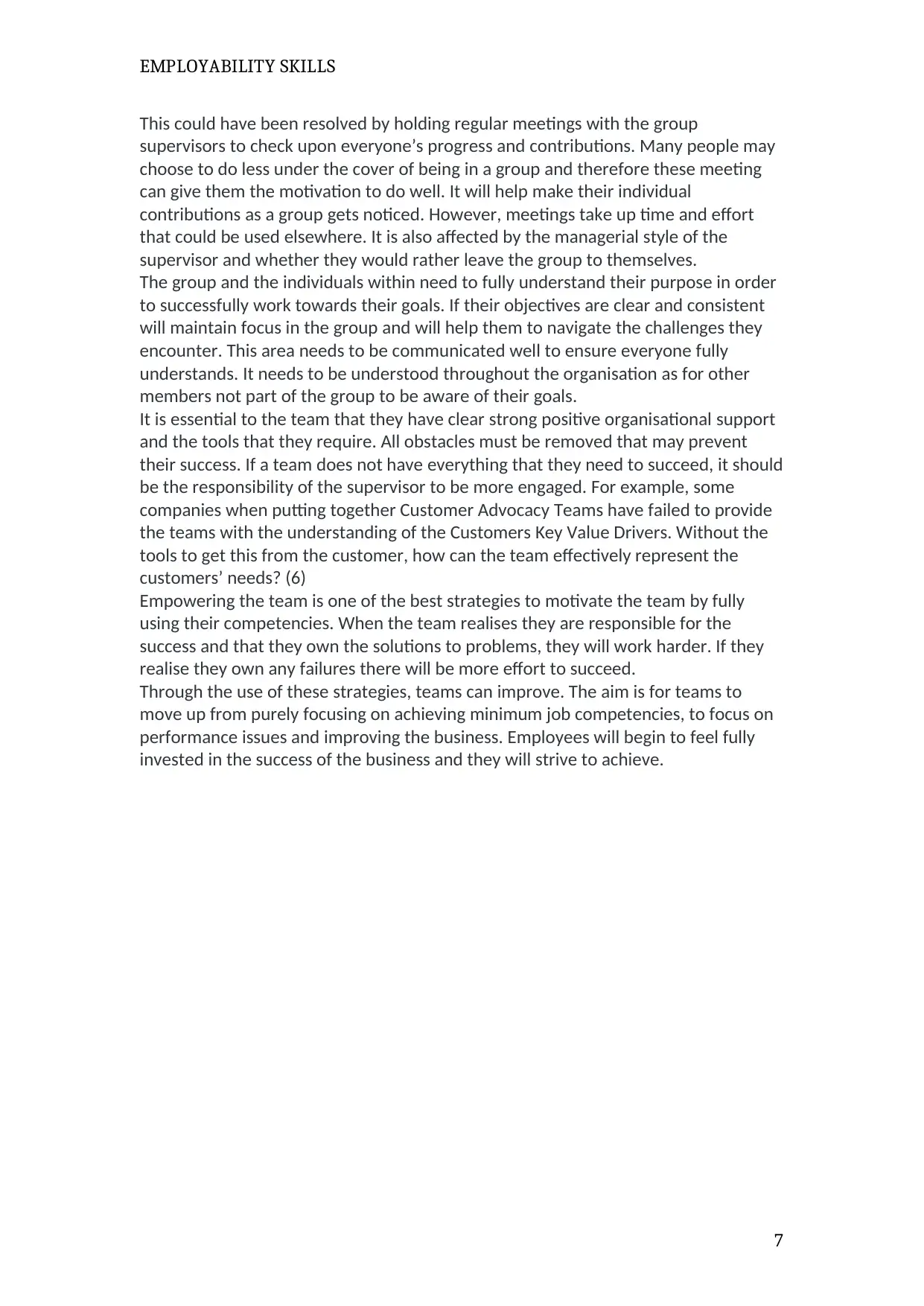
EMPLOYABILITY SKILLS
This could have been resolved by holding regular meetings with the group
supervisors to check upon everyone’s progress and contributions. Many people may
choose to do less under the cover of being in a group and therefore these meeting
can give them the motivation to do well. It will help make their individual
contributions as a group gets noticed. However, meetings take up time and effort
that could be used elsewhere. It is also affected by the managerial style of the
supervisor and whether they would rather leave the group to themselves.
The group and the individuals within need to fully understand their purpose in order
to successfully work towards their goals. If their objectives are clear and consistent
will maintain focus in the group and will help them to navigate the challenges they
encounter. This area needs to be communicated well to ensure everyone fully
understands. It needs to be understood throughout the organisation as for other
members not part of the group to be aware of their goals.
It is essential to the team that they have clear strong positive organisational support
and the tools that they require. All obstacles must be removed that may prevent
their success. If a team does not have everything that they need to succeed, it should
be the responsibility of the supervisor to be more engaged. For example, some
companies when putting together Customer Advocacy Teams have failed to provide
the teams with the understanding of the Customers Key Value Drivers. Without the
tools to get this from the customer, how can the team effectively represent the
customers’ needs? (6)
Empowering the team is one of the best strategies to motivate the team by fully
using their competencies. When the team realises they are responsible for the
success and that they own the solutions to problems, they will work harder. If they
realise they own any failures there will be more effort to succeed.
Through the use of these strategies, teams can improve. The aim is for teams to
move up from purely focusing on achieving minimum job competencies, to focus on
performance issues and improving the business. Employees will begin to feel fully
invested in the success of the business and they will strive to achieve.
7
This could have been resolved by holding regular meetings with the group
supervisors to check upon everyone’s progress and contributions. Many people may
choose to do less under the cover of being in a group and therefore these meeting
can give them the motivation to do well. It will help make their individual
contributions as a group gets noticed. However, meetings take up time and effort
that could be used elsewhere. It is also affected by the managerial style of the
supervisor and whether they would rather leave the group to themselves.
The group and the individuals within need to fully understand their purpose in order
to successfully work towards their goals. If their objectives are clear and consistent
will maintain focus in the group and will help them to navigate the challenges they
encounter. This area needs to be communicated well to ensure everyone fully
understands. It needs to be understood throughout the organisation as for other
members not part of the group to be aware of their goals.
It is essential to the team that they have clear strong positive organisational support
and the tools that they require. All obstacles must be removed that may prevent
their success. If a team does not have everything that they need to succeed, it should
be the responsibility of the supervisor to be more engaged. For example, some
companies when putting together Customer Advocacy Teams have failed to provide
the teams with the understanding of the Customers Key Value Drivers. Without the
tools to get this from the customer, how can the team effectively represent the
customers’ needs? (6)
Empowering the team is one of the best strategies to motivate the team by fully
using their competencies. When the team realises they are responsible for the
success and that they own the solutions to problems, they will work harder. If they
realise they own any failures there will be more effort to succeed.
Through the use of these strategies, teams can improve. The aim is for teams to
move up from purely focusing on achieving minimum job competencies, to focus on
performance issues and improving the business. Employees will begin to feel fully
invested in the success of the business and they will strive to achieve.
7
Paraphrase This Document
Need a fresh take? Get an instant paraphrase of this document with our AI Paraphraser
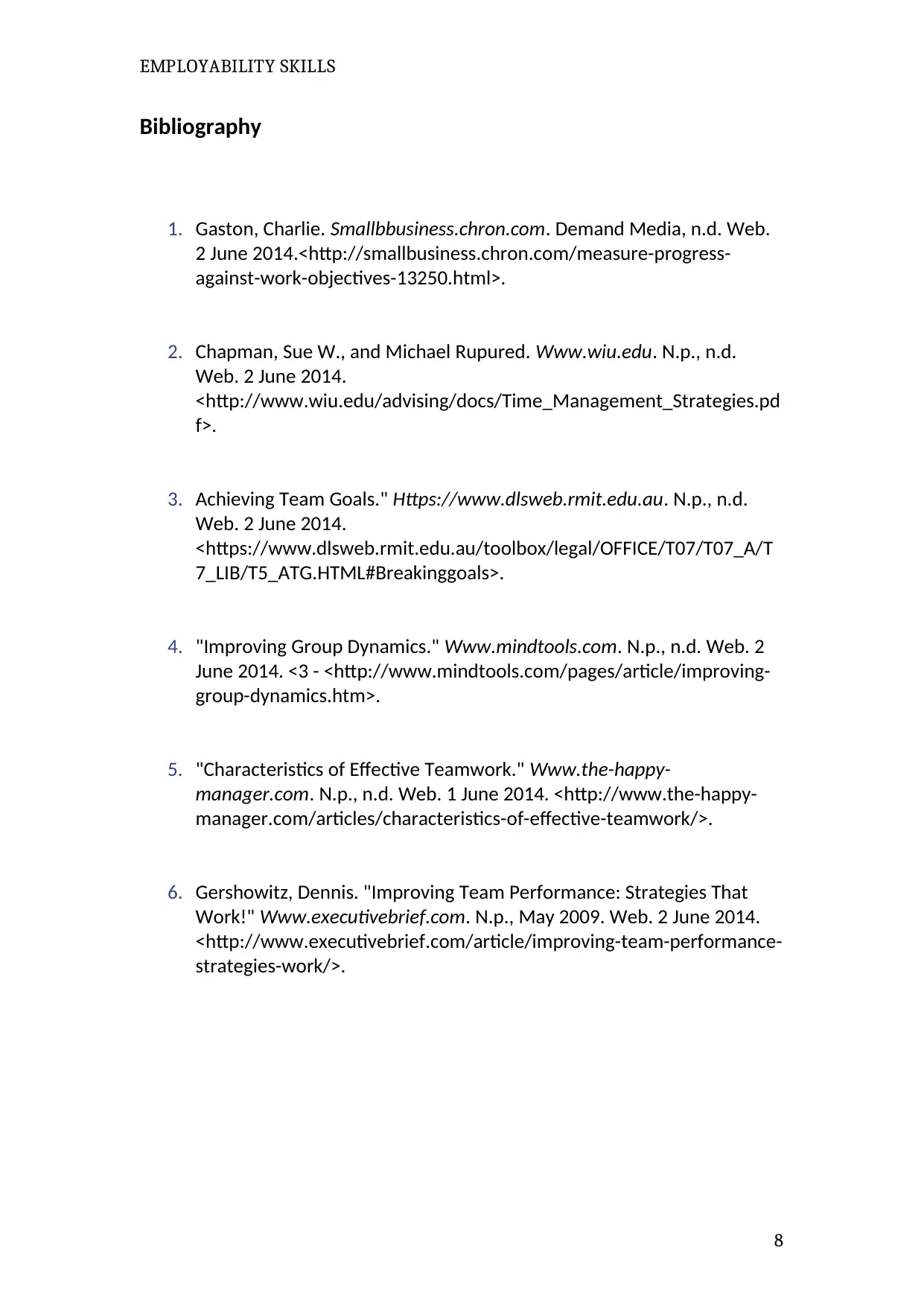
EMPLOYABILITY SKILLS
Bibliography
1. Gaston, Charlie. Smallbbusiness.chron.com. Demand Media, n.d. Web.
2 June 2014.<http://smallbusiness.chron.com/measure-progress-
against-work-objectives-13250.html>.
2. Chapman, Sue W., and Michael Rupured. Www.wiu.edu. N.p., n.d.
Web. 2 June 2014.
<http://www.wiu.edu/advising/docs/Time_Management_Strategies.pd
f>.
3. Achieving Team Goals." Https://www.dlsweb.rmit.edu.au. N.p., n.d.
Web. 2 June 2014.
<https://www.dlsweb.rmit.edu.au/toolbox/legal/OFFICE/T07/T07_A/T
7_LIB/T5_ATG.HTML#Breakinggoals>.
4. "Improving Group Dynamics." Www.mindtools.com. N.p., n.d. Web. 2
June 2014. <3 - <http://www.mindtools.com/pages/article/improving-
group-dynamics.htm>.
5. "Characteristics of Effective Teamwork." Www.the-happy-
manager.com. N.p., n.d. Web. 1 June 2014. <http://www.the-happy-
manager.com/articles/characteristics-of-effective-teamwork/>.
6. Gershowitz, Dennis. "Improving Team Performance: Strategies That
Work!" Www.executivebrief.com. N.p., May 2009. Web. 2 June 2014.
<http://www.executivebrief.com/article/improving-team-performance-
strategies-work/>.
8
Bibliography
1. Gaston, Charlie. Smallbbusiness.chron.com. Demand Media, n.d. Web.
2 June 2014.<http://smallbusiness.chron.com/measure-progress-
against-work-objectives-13250.html>.
2. Chapman, Sue W., and Michael Rupured. Www.wiu.edu. N.p., n.d.
Web. 2 June 2014.
<http://www.wiu.edu/advising/docs/Time_Management_Strategies.pd
f>.
3. Achieving Team Goals." Https://www.dlsweb.rmit.edu.au. N.p., n.d.
Web. 2 June 2014.
<https://www.dlsweb.rmit.edu.au/toolbox/legal/OFFICE/T07/T07_A/T
7_LIB/T5_ATG.HTML#Breakinggoals>.
4. "Improving Group Dynamics." Www.mindtools.com. N.p., n.d. Web. 2
June 2014. <3 - <http://www.mindtools.com/pages/article/improving-
group-dynamics.htm>.
5. "Characteristics of Effective Teamwork." Www.the-happy-
manager.com. N.p., n.d. Web. 1 June 2014. <http://www.the-happy-
manager.com/articles/characteristics-of-effective-teamwork/>.
6. Gershowitz, Dennis. "Improving Team Performance: Strategies That
Work!" Www.executivebrief.com. N.p., May 2009. Web. 2 June 2014.
<http://www.executivebrief.com/article/improving-team-performance-
strategies-work/>.
8
1 out of 8
Related Documents
Your All-in-One AI-Powered Toolkit for Academic Success.
+13062052269
info@desklib.com
Available 24*7 on WhatsApp / Email
![[object Object]](/_next/static/media/star-bottom.7253800d.svg)
Unlock your academic potential
Copyright © 2020–2025 A2Z Services. All Rights Reserved. Developed and managed by ZUCOL.



